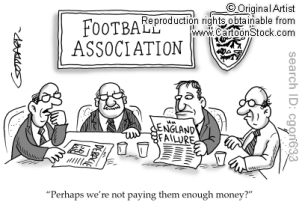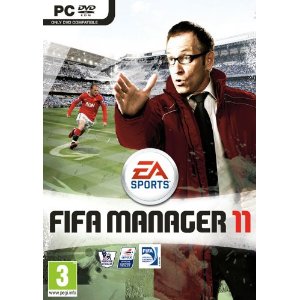Whether buying a whole Premiere League Soccer Club for 136 Million Pounds, earning 23.2 Million Pounds salary per year or being considered worth more than 90 Million Euros…In soccer we talk about the most incredible amounts of money.

Already commercialized in the past?
According to Gabriel Kuhn, many leading clubs were exploited by companies and factory owners, at least for prestige. So the increasing commercialization in the twentieth century was not a result of an external force but of intrinsic logic.
Kuhn claims, that over the last twenty years, the commercialization has taken on momentum. Champions leagues, multi billion dollar TV contracts, celebrity players, a ruthless merchandising industry that doesn’t stop selling and marketing corporate-sponsored jerseys are all an expression of this.
Soccer: Show Business?
Dirk Zingler, President of Union Berlin emphasizes this; “Flag wavers, cardboard clappers and goal music- football has become show business.”
As Dr. Jacques Rogge, President of the IOC is quoted from the IOC website, “Without the support of the business community, without its technology, expertise, people, services, products, telecommunication, its financing — the Olympic Games…cannot happen. Without this support, the athletes cannot compete and achieve their very best in the world’s best sporting event.” This can be transferred to all the other sports as well and every sport has its price usually it is advertising, which makes it possible for companies to identify themselves with a certain club, for example, and appear to a certain target group as well as publicize themselves. http://www.olympic.org/
According to Mark Fisher, quoted by blogger Ben Jeffrey, the price of success just is the ballooning wages, the de-nationalization, the conspicuous consumption of the top-class players and the ruthlessness of clubs where loyalty counts for little if it doesn’t pay.
Exploitation or Benefit?
The commercialization of football has yielded immense benefits for fans, in terms of infrastructure, quality of play and global coverage to cover the passion for their loved sport, claims Ben Jeffrey.
The number of wireless smartphone owners, who have downloaded an app nearly doubled in the past two years, from 22% in September 2009 to 38% in August 2011, with sports apps belonging to the most common downloaded apps, believes Hugh Thompson.
Given this rapid adoption of smartphones by average consumers, Pat Coyle was curious to see if social sports fans were adopting smartphones at similar rates. Turns out they’re not. Sports fans adopting smart phones much faster the mainstream average. In some cases, 9 of 10 fans already have smartphones. So for any sports marketer who didn’t get out of bed this morning thinking about smartphones should take this as their wake up call, says Pat Coyle.
One example, named by Samantha Goldberg, is the ESPN ScoreCenter an app that had about 1.7 million daily unique visitors in the past three months.
My opinion
These apps might cost little, but they sum up to amazing sums. I must admit that I have quite some on my phone as well. The marketing strategies and the merchandising strategies used by sport clubs and federations can be considered perfectionised. There is nothing we can’t get today; soccer apps, playstation games to simulate a mangers life or the life of a celebrity soccer player…there are no limits.



Marius
/ 2012/02/07Hi Mirja,
really interesting topic and well written blog post. I also observed the commercialization of soccer in the last decades which makes football for the most people not affordable anymore. If you just watch the ticket prices for the World Cup Final 2010 where tickets were not available under $ 150 even in South Africa leads to the conclusion that football is becoming a sport for rich people. Therefore I appreciate clubs like Union Berlin or FC St. Pauli who try their best to evade this trend and where the real interests lie in the supporters on the stand who would give everything for their club. Another interesting point where you can see the progessing commercialization of soccer is the battle between the two video games developers Konami and EA for the licencising rights of different leagues for their video games PES and FIFA 12, respectively.
http://www.capetownmagazine.com/buy-tickets-2010-world-cup-/World-Cup-Ticket-Prices-Finalised/107_22_3267